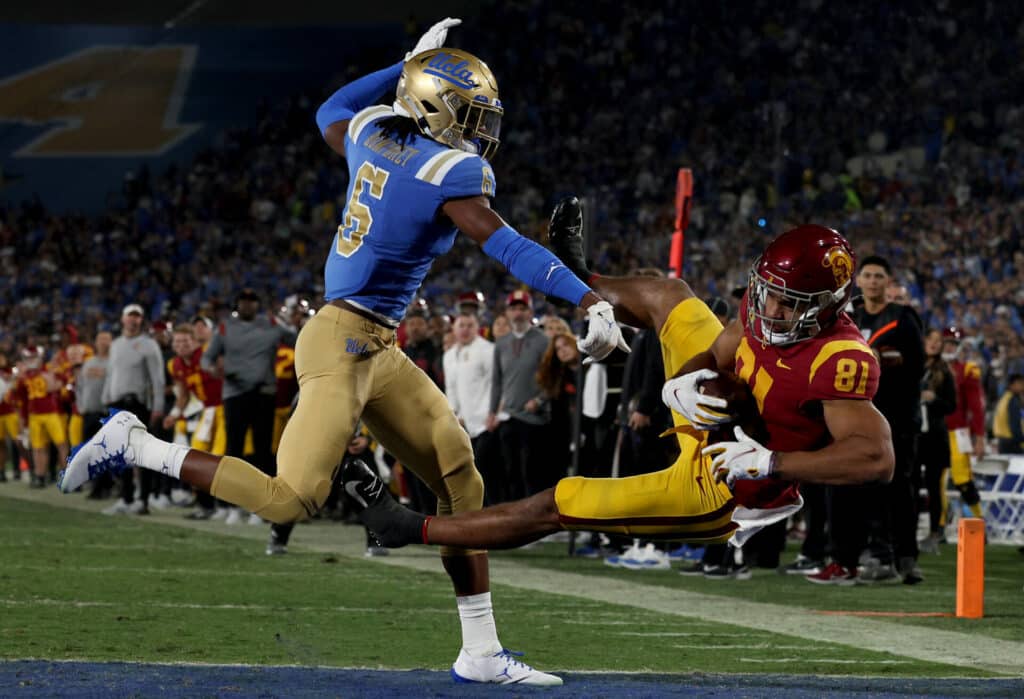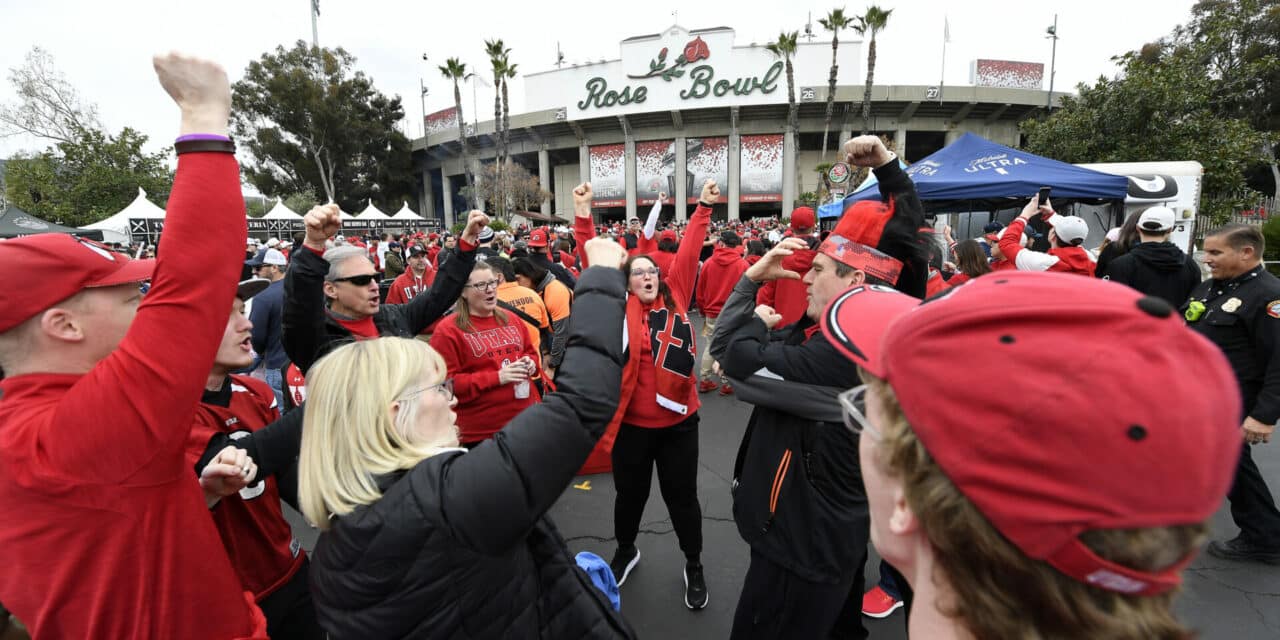BOUNCING BACK: The iconic Rose Bowl Stadium expects to rebound financially over the next several years with UCLA football competing in the Big Ten Conference in 2024 (Getty Images)
ROSY OUTLOOK AFTER HEAVY FINANCIAL LOSSES
The Rose Bowl Operating Company, the nonprofit that runs Pasadena’s Rose Bowl Stadium, is finally seeing the light at the end of the long dark tunnel that is the coronavirus pandemic. The group overseeing events at the historic venue recently presented an updated financial report that shows the site will turn a profit by 2027, citing UCLA’s move to the Big Ten Conference as a key revenue source next year as well as a busy events calendar that includes live music and a popular flea market.
“What we’re excited about is the fact that we’re now going to a point where we’ll have a balanced operating budget, which means that we’ll have more money to put toward capital,” said Jens Weiden, Rose Bowl Stadium CEO and general manager . “Capital is really the most important thing for a building that’s 100 years old and is still as busy and relevant and vibrant as the day it was built.”
It was only 11 months ago when representatives of the RBOC went before the Pasadena City Council and painted a grim picture of the city’s stadium nestled in the Arroyo Seco near Los Angeles, California. Much like every other venue in the world, Rose Bowl Stadium, an iconic structure that has hosted UCLA football since 1982 and some of the biggest sporting events, has struggled to recover from COVID-19 shutdowns and was projected to be operating with a $19.3 million deficit by 2027.
But then came the answer to their prayers: UCLA and USC announced last June that they are leaving the Pac-12 Conference for the Big Ten in 2024, a move that would mark a monumental shift for not only the college football landscape but the Rose Bowl and City of Pasadena. Encouraged by the most recent pro forma financial statements, the City Council unanimously voted in favor of extending its operating agreement with the RBOC for an additional two years through July 1, 2025.
It is well known in the college football world that fans of Big Ten teams, most of which are located in the Midwest, travel well and can boost the economies of the cities they visit. Pasadena would know — the city’s beloved stadium has hosted nearly every Rose Bowl Game, dubbed as “The Granddaddy of Them All,” since 1923 with dozens of thousands sporting their team’s colors and basking in the Southern California sun on a winter day at the stadium. It truly is a sight to behold every New Year’s holiday, and Weiden envisions it now happening throughout the college football regular season with visitors expected to be more willing to visit from September-November before airfare and hospitality rates inflate to holiday pricing. Flights and lodging booked a year in advance are more affordable than short-term bookings, and Big Ten games at the Rose Bowl should boost local hotel income as well. A small percentage of what visitors pay, commonly known as a bed tax, will generate funds toward the city’s tourism marketing efforts, which should help the stadium attract more events.
“The neat thing now is that between [UCLA] and USC, every weekend there is going to be most likely a Big Ten town that’s going to come into Los Angeles and be everywhere,” Weiden said. “This is going to be like a lot of little Rose Bowl games throughout the fall. (We expect) folks will come spend like they are on vacation, and it means our revenues at the building and UCLA’s revenues are going to go up.”

MONUMENTAL SHIFT: UCLA and USC shocked the sports world when they announced their move to the Big Ten Conference last summer. Rose Bowl Stadium expects more fans in the stands when the Bruins take on Big Ten opponents in 2024. (Getty Images)
Bruins fans may not be known for filling up their home stadium, but Weiden believes that will change next year as the move to a more lucrative conference from a gate and television revenue standpoint should help the football program’s recruiting efforts.
“UCLA is going to step up, and you’re going to see a lot more UCLA fans here because, at a point, you also want to make sure your home field is your home field,” says Weiden, who succeeded longtime Rose Bowl Stadium CEO Darryl Dunn last July. “We’ve talked quite a bit about UCLA and working on some improvements in and around the building to improve the fan experience and correlate the timing with the movement to the Big Ten.”
The RBOC isn’t dancing in the end zone just yet as there’s still much work to be done in balancing the budget and building enough funds to get the site where they want it to be. Rose Bowl Stadium went through some renovations seven years ago that cost $183 million, but the CEO acknowledges that more improvements are needed throughout the facility and he is hoping to address them in the near future.
“LA is the most competitive stadium and arena market in the world, and while we’re not going to go and compete with brand new buildings that have huge video boards hung from a roof that we don’t have, that’s not our point,” Weiden said.
“We cherish our setting; it’s what sets us apart,” he said. “But that doesn’t mean we can’t invest in different video board products and other fan amenities when it comes to legroom, aisles and seats. Those are the really exciting ones that I think you’ll see in the next year or two that are going to come out and our foundation is going to raise money toward. It will make the experience match the expectation for folks that travel across the country to come to the Rose Bowl.”
Stadium operators are already thinking about how to accommodate more fans and experimented with grab-and-go concession stands that served as mini markets with self-checkout kiosks during this year’s Rose Bowl game. Weiden told council members that sales of those stands doubled as a result of speedier purchases. Food and beverage at the stadium are run by Levy Restaurants, which also works with Big Ten teams Ohio State and Northwestern.
“People in LA have a lot of options with their entertainment dollar, where they can spend that, and especially UCLA fans that come out to maybe six games a year,” Weiden told the Council. “To make sure we reduce the friction is very important. That is something we’re very much focused on, on our limited concourse, because there’s no real room to move out, so we’ve tried to get better with what we have.”
Having a century-old structure has its limitations and challenges with costly maintenance and outdated amenities that can make it difficult to keep up with the competition, specifically SoFi Stadium, but the RBOC still manages to draw big names from the music industry to its unique site that includes the surrounding Brookside Golf Course, distributed over 200 acres.
Rose Bowl Stadium has averaged 25 large-scale events over the past two years, and Weiden was “happy to report that our event bookings are at the highest level they’ve ever been.” RBOC has a partnership with AEG Goldenvoice to produce outdoor festivals on the golf course, which is also where football and soccer fans gather to tailgate prior to games.
“We are the best festival site in Los Angeles,” Weiden said. “[Our partnership with Goldenvoice has] become one of the most exciting parts of our business, because it leans on what makes us special, and that’s our setting. People walk on the site, look around and can’t believe they can go sit on beautiful grass or underneath an oak tree or get food and sit next to the lake between stages.”

Jens Weiden
Weiden wants to continue building on that vision, one that Coldplay frontman Chris Martin shares. The band, which canceled shows at SoFi Stadium last year due to production issues, announced in January they will perform two nights this fall at Rose Bowl Stadium, a place Martin recently called “special” during an interview with an LA radio station.
“We were supposed to play another place last year and then we had to postpone it because of various reasons,” Martin said during the broadcast. “The Rose Bowl is our favorite place to play now, because it’s open and old and beautiful and simple.”
Coldplay won’t be the only big name at the stadium this year. Karol G, one of the most successful female Latin solo acts in the live industry, will perform two nights in August.
“Getting busy with events helps us in all areas to do business — leverage sponsorship sales, season ticket sales because customers get additional content, revenues to invest in the building and return more money for promoters,” Weiden said.
While there are plenty of concerts and music festivals to go around for venues in southern California, the Rose Bowl must be aggressive to generate revenue that would allow the RBOC to invest in the site’s aging infrastructure and meet the demanding expectations of fans. Most important, they need to prove that budget projections are legitimately real and not wishful thinking.
“The focus for us is to stay relevant,” Weiden says. “We need to make sure that our events are successful, work with our partners on the music festival side, work with UCLA and the Tournament of Roses. It’s what is going to build the top of the funnel. If you work well with events, more events come into that. We need to prove our financial performance. Over the next two years, we need to step up and make sure we deliver, and we will.”







